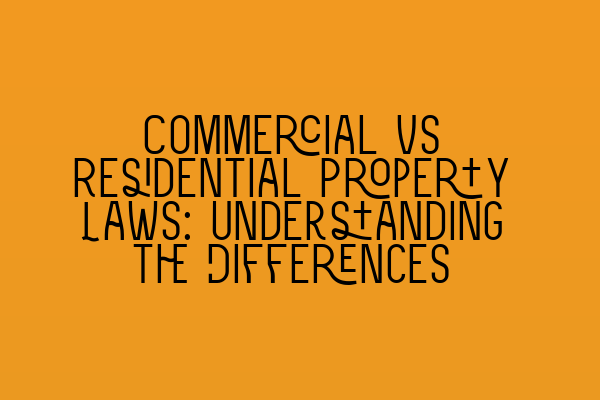Commercial vs Residential Property Laws: Understanding the Differences
As a solicitor specializing in property law, understanding the differences between commercial and residential property laws is essential. These two areas of property law have distinct rules and regulations that govern them, and it’s vital for both lawyers and clients to be aware of these nuances. In this blog post, we will explore the key differences between commercial and residential property laws and explain why this knowledge is crucial in ensuring successful transactions and legal compliance.
1. Purpose and Use
The first and most obvious difference between commercial and residential property is their purpose and use. Commercial properties are typically used for business-related activities, such as offices, retail stores, warehouses, and factories. On the other hand, residential properties are designed for habitation by individuals or families and include houses, apartments, and condominiums.
It is important to note that certain properties can have a mixed-use designation, which means they serve both commercial and residential purposes. For instance, a building could have commercial units on the ground floor and residential units on the upper floors. In such cases, both commercial and residential property laws may apply, and it is crucial to navigate the legal requirements for each.
2. Ownership and Tenancy
Another significant difference between commercial and residential property laws relates to ownership and tenancy. In commercial property transactions, leases and agreements tend to be more complex and often involve longer terms compared to residential leases. Commercial leases often come with additional clauses covering maintenance, repairs, insurance, and other responsibilities that may not be present in residential leases.
Additionally, commercial property leases often involve higher rental rates and stricter financial requirements for tenants. These factors, along with the unique needs of commercial businesses, necessitate a more thorough understanding of the legal aspects involved in commercial tenancies.
Conversely, residential leases are typically more straightforward, focusing on issues like rent, occupancy, and tenant rights. Residential property laws prioritize the protection of tenants and their rights, including the right to habitable conditions, privacy, and fair treatment. It is essential for property lawyers to be well-versed in these laws to protect the interests of both landlords and tenants.
3. Legal Protections and Regulations
Commercial and residential properties are subject to different legal protections and regulations. Residential properties are governed by numerous regulations aimed at ensuring the safety, health, and welfare of the occupants. These regulations cover areas such as building codes, zoning restrictions, and landlord-tenant laws.
Commercial properties, on the other hand, have a different framework of protections and regulations. The emphasis is on facilitating business activities while ensuring compliance with various laws, including those related to health and safety, accessibility, licensing, and permits.
Legal practitioners must stay up-to-date with the ever-evolving legislation governing both commercial and residential properties. This knowledge enables them to guide clients through complex legal requirements and ensure full compliance with the law.
4. Investment and Financial Considerations
Investing in commercial and residential properties also involves different financial considerations. Commercial properties often involve higher purchase prices and rental values, making them attractive to investors seeking long-term returns. However, commercial properties may also come with increased risks due to market fluctuations and tenant turnover.
Residential properties, on the other hand, generally provide greater stability and consistent demand. Investing in residential properties is often considered a lower-risk option, particularly when dealing with properties located in desirable areas.
Understanding the financial aspects specific to each property type is crucial for providing tailored advice to clients and helping them make informed investment decisions.
Conclusion
Understanding the differences between commercial and residential property laws is vital for solicitors specializing in property law. Commercial and residential properties have distinct purposes, ownership and tenancy structures, legal protections, and financial considerations. By staying informed and up-to-date on the latest legislation and regulations, property lawyers can effectively navigate the complexities of each property type and provide valuable counsel to clients.
At SQE Property Law & Land Law, our team of experienced solicitors specializes in both commercial and residential property matters. Whether you are a landlord, tenant, buyer, or seller, we can assist you in navigating the legal complexities of property transactions and ensure that your interests are protected.
For further resources and information on various aspects of property law and related topics, we encourage you to explore our website. Additionally, if you are preparing for the SQE exams or seeking preparation courses, be sure to check out our related articles:
– SQE 1 Practice Exam Questions
– SQE 1 Practice Mocks FLK1 FLK2
– SQE 2 Preparation Courses
– SQE 1 Preparation Courses
– SRA SQE Exam Dates
Contact SQE Property Law & Land Law today to discuss your specific legal needs and benefit from our expertise in commercial and residential property law.
